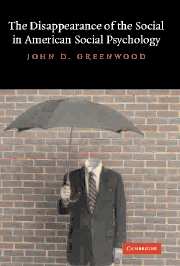Book contents
- Frontmatter
- Contents
- Preface
- Introduction: What Happened to the “Social” in Social Psychology?
- 1 The Lost World
- 2 Wundt and Völkerpsychologie
- 3 Durkheim and Social Facts
- 4 The Social and the Psychological
- 5 Social Psychology and the “Social Mind”
- 6 Individualism and the Social
- 7 Crowds, Publics, and Experimental Social Psychology
- 8 Crossroads
- 9 Crisis
- 10 The Rediscovery of the Social?
- References
- Index
9 - Crisis
Published online by Cambridge University Press: 18 December 2009
- Frontmatter
- Contents
- Preface
- Introduction: What Happened to the “Social” in Social Psychology?
- 1 The Lost World
- 2 Wundt and Völkerpsychologie
- 3 Durkheim and Social Facts
- 4 The Social and the Psychological
- 5 Social Psychology and the “Social Mind”
- 6 Individualism and the Social
- 7 Crowds, Publics, and Experimental Social Psychology
- 8 Crossroads
- 9 Crisis
- 10 The Rediscovery of the Social?
- References
- Index
Summary
Farr (1996, p. 156) notes that historical contributors to the various editions of the Handbook of Social Psychology (G. W. Allport, 1954, 1968a, 1985; Jones, 1985, 1998) have come to represent American social psychology as having a “long past” but “short history” (echoing Gustav Fechner's famous claim about scientific psychology). Many represent the “short history” as beginning with the 1935 edition of the handbook, especially Dashiell's (1935) chapter on experimental social psychology, and coming to full fruition with the explosive postwar development of the discipline. Indeed, some claim social psychology only really became a scientific discipline in the postwar period, when practitioners embraced a common experimental paradigm for social psychological investigation (Levine & Rodrigues, 1999). Many authors also note that the postwar development built upon the prewar foundations of the 1930s. As Cartwright (1979) put it, “social psychologists were well-prepared to respond” to the war (p. 84), and after the war they developed “a vast storehouse of well-established empirical findings” (p. 87).
This is important to stress. Although the immediate postwar years witnessed perhaps the high-water mark of social forms of social psychology, they also witnessed the explosive development of the asocial scientific and experimental tradition that originated in the 1920s and 1930s. Many of the founders of scientific and experimental social psychology in the 1920s and 1930s repudiated the competing theoretical paradigms prevalent at the time (appeals to instinct, the group mind, crowd theories, and so forth) and established a “new theoretical and methodological approach” (Cartwright, 1979, p. 83).
- Type
- Chapter
- Information
- The Disappearance of the Social in American Social Psychology , pp. 214 - 244Publisher: Cambridge University PressPrint publication year: 2003



